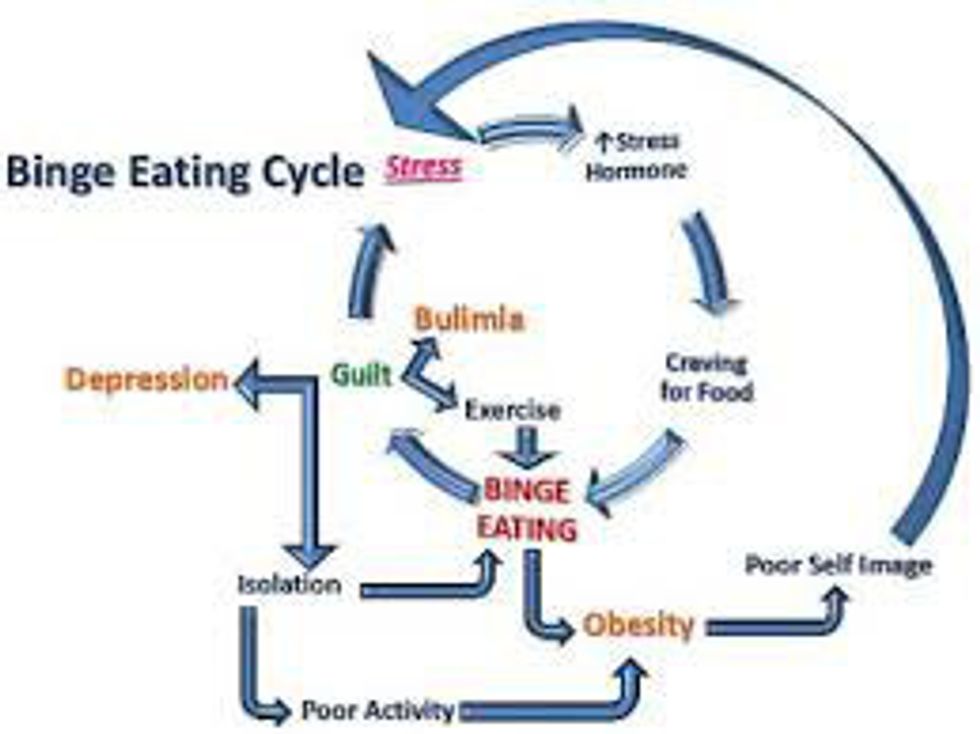My face was plastered to the garbage bag that hung from my bed, and I dangled from the edge. The vomit stuck my newly dyed hair to my face like a thumb tack, and the pressure into my skull pushed my head further into the bag of regurgitated Kit-Kat bars and pop tarts. My left nostril began to bleed; some blood went down my throat, and some splattered along the walls of my bedroom. Before you label me a bulimic, know that I did not purposely purge my food. After four consecutive days of relentless binge eating, my body yelled, “Bitch, enough!” My family didn’t know how or why this was happening. They have never seen me binge eat, or even eat unhealthy, for that matter. I have gotten good at it. Over the years, I have found new hiding places to eat, including the bathroom, and new places for wrappers, which includes the glove compartment of my Mercedes.
99% of my days are spent with four-mile runs, spinach smoothies,
and green tea. The other one percent, however, looks like that. It’s ugly. It’s
scary. A lot of people with whom I have disclosed my binge eating disorder give
me advice along the lines of, “Just stop when you’re full.” Or, “Just have junk
in moderation.” I don’t ask for advice anymore. What people fail to recognize
is the all-consuming, controlling nature of the disorder, and the power it has
over its victims. But in truth, I’m glad my close friends and family cannot
help me with this, because it means they have never had that same pain of
self-disgust, physical discomfort, and personal embarrassment.
Maybe that’s why no one talks about it. Maybe that’s why when you think “eating disorder,” you imagine women with projected collarbones and a visible rib cage, or a movie star throwing up in the bathroom before a photo shoot. Remarkably, it is but a more severe image of what you’d envision on a catwalk or in a Victoria’s Secret catalog. One way or another, these images have become accepted, even glorified, as the upmost image of control and beauty. The media has no problem revealing a woman coughing up her meal or announcing a new diet, but try to remember the last time you saw one of those figures over indulge. God forbid one does gain a little weight, it’s plastered across every headline, and labeled a “breakdown.”
Ironically, binge eating is learned through strict dieting that ultimately creates a "bing, repent, repeat" cycle, as noted by Dr. Michelle May, author of Eat What You Love, Love What You Eat. Dr. May 's TedTalks speech highlights the theme of her book-- her philosophy on mindful eating. Like many of us, she envied the people in her life (husband, kids, etc.) who ate the foods they loved without over indulging or feeling guilty. She notes in amazement, "They ate when they were hungry and stopped when they were full." It is incredible that those primitive functions have been lost by so many of us, including myself, through excessive dieting, Such ridged and strict mindsets have given us a completely different relationship with food than that of fuel. It is now labeled "good" or "bad," and used as a reward, a comfort, or as we discussed earlier, a means of control.
But if your control is channeled into what you put into your body, what happens when you have that one, human moment, of losing control? This "all or nothing" mentality that drives the strict tracking, tedious measuring, and disciplined gym time, is also the fuel for the crash. And to make up for the crash, it's only logical to excessively diet and exercise even more. It's a cycle.
Louis C.K. said in his stand-up skit, "I don't eat until I'm full. I eat until I hate myself." For a light-hearted line, it hit home pretty hard. Like any other eating disorder, Binge Eating is a dangerous trigger for depression, self-esteem, and quality of life, and is becoming more common every year. Victims are not only young women, but people of all ages, especially those in the fitness industry, whose livelihood is dependent on their image/means of control.
It's easy to brush this one off. It's easy to say, "Oh, I just overate," and sometimes that is all it is. But other times, it's not. And when it's not, it's hard to talk about. It's hard to admit to the box of cookies you locked yourself in the bathroom to finish, or the freezer-burnt ice cream cake you ate with your head halfway into the freezer. It's embarrassing to admit to that loss of control.
But it happens, and it's real. And if you don't stop the cycle, it'll just happen again.












































